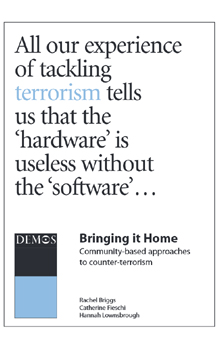
Author: Hannah Lownsbrough, Rachel Briggs, Catherine Fieschi
Genre: Muslims
Publisher: Demos
Release Date: 04 December 2006
Pages: 96
This is a radical study that jettisons much of Government policy and “reactionary” ministerial statements to the dustbin. It makes pointed refererence to the Government’s search for quick fixes and its descent into authoritarianism. It notes that when objections were raised to the Home Office’s choice of ‘Islamophobia and Extremism’ as a workshop title, these were faced down on the grounds that it reflected the Department’s agenda. The authors note, “this kind of practice does not promote local engagement; it reinforces the perception that the government is interested only in talking and leading, not listening and partnering”. It adds, “one of the reasons that the government is getting things wrong is because it has a shallow and partial understanding of the communities with which it needs to engage, which makes it behave schizophrenically”.
The report has drawn on interviewees with Muslim community members, local police, community officials and national policy makers, and a conference at Wilton Park in March 2006. It quotes Salma Yaqub: “Excuse me but you’re sitting here asking me about the causes of terrorism and we’re going round the houses examining potential causes – but there’s an elephant in the room: the war in Iraq. Look no further”.
The report notes, “[but] the government’s actions in the last five years mean that effective community engagement will not be easy, and is certainly not a low-risk option. Building meaningful partnerships with Muslim communities will require the government to take their grievances seriously, which could open up difficult discussions and disagreements for the government, not least around foreign policy and the war in Iraq”.
The report recognises a number of opportunities offered by Muslims in Britain. The younger generation in particular brings an “enormous energy and passion….whose political commitment is in stark contrast to that of the rest of the British public at the moment”. Moreover, “given the interconnectedness of home and abroad and the tight links between Muslim communities and their countries of origin, British Muslims could provide vital insight and expertise, which could help the government to formulate effective policies. This resource is rarely tapped at the present time”.
The report calls for the establishment of a British Muslim Youth Congress, which could “become the voice of young Muslims, making recommendations to the government and community represenative organisations, such as the MCB”. The report however contains a number of glosses. First, it recommends the creation of a “cabinet-level minister with overall responsibility for the whole of the counter-terrorism portfolio”. What are the guarantees that this would not lead to an increased authoritarianism? There are not many politicians one would trust with such powers.
Second, the work of the Radical Middle Way project is applauded while at the same time a call is made that government funding should be reflective of a ‘representative governance test’.
Finally, the report’s section on ‘The Bosnian Connection’ notes that “during our research, a number of imams from mosques and universities reported seeing signs of radicalisation emerging from the early 1990s onwards, which could be linked to the activity in Bosnia. . . at the time, the intelligence agencies failed to see the significance of these events”. This is disingenous to say the least. Former minister Michael Meacher himself noted , in his article ‘Britain now faces its own blowback’ (The Guardian, 10th September 2005) that “less well known is evidence of the British government’s relationship with a wider Islamist terrorist network [in Bosnia during the early 1990s]. During an interview on Fox TV this summer, the former US federal prosecutor John Loftus reported that British intelligence had used the al-Muhajiroun group in London to recruit Islamist militants with British passports for the war against the Serbs in Kosovo. Since July Scotland Yard has been interested in an alleged member of al-Muhajiroun, Haroon Rashid Aswat, who some sources have suggested could have been behind the London bombings”. It is now also suggested that Richard Perle and Douglas Feith established the Bosnia Defence Fund that partly supported Al Qaeeda units in Bosnia.
On the whole the report is a welcome relief from the standard government line that has sought to ‘problemetise’ the Muslim community at every turn, best illustrated in the proposal in November 2005 to institute a system of discriminatory ‘restriction orders’ on places of worship (i.e. mosques) on the basis of what transpired at Finsbury Park.
It is refreshing that this report does not assign responsibility for the formation of the Muslim Council of Britain to New Labour! However parentage is this time ascribed to the Tories: “In the early 1990s, faced with the challenge of dealing with a complex Muslim community, then Home Secretary, Michael Howard encouraged the establishment of the Muslim Council of Britain to act as a one-stop-shop for government with Muslims”. The truth of the matter is that the Rushdie Affair and the Bosnian tragedy brought together a large number of Muslim community organisations from across the country in joint activities – delegations, national marches, media responses and publications. Thus a network emerged across Muslim civil society culminating in the formation of the National Interim Committee on Muslim Unity (NICMU) in April 1994. It was a natural birth – in response to a wide-spread realisation that unless the community became united the outlook would be bleak (for details see ‘An invitation to form the Muslim Council of Britain’, 1997).
M. A. Sherif, 2006
